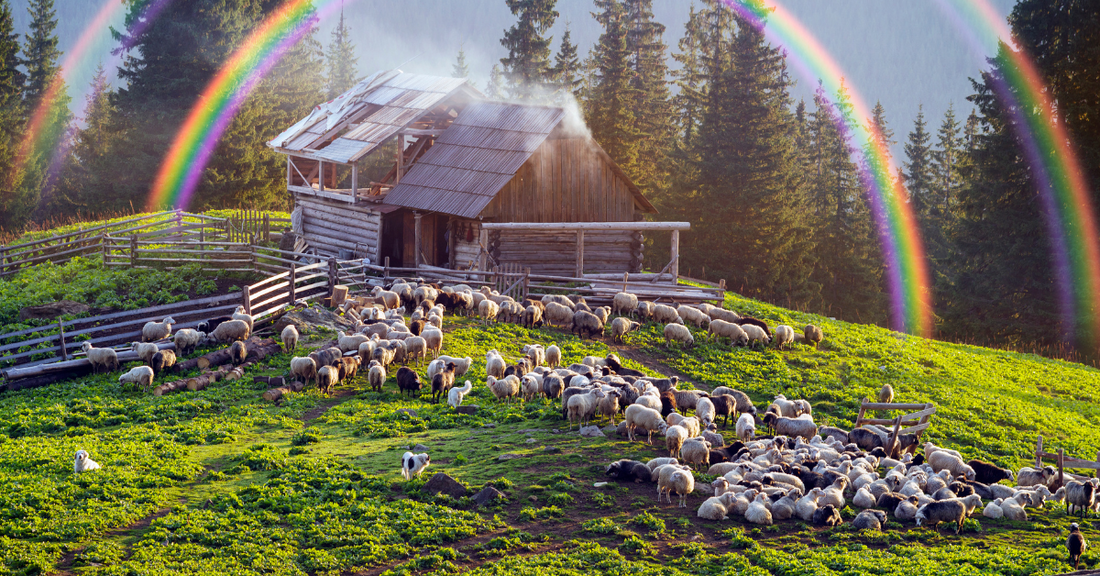
Mystical Meanings of Sheep
Share
Have you ever wondered what sheep symbolize beyond their cute, fluffy exterior? These gentle creatures often appear in literature, folklore, and spiritual teachings, each time representing something unique and profound. In this post, we'll explore the rich symbolism of sheep, how they connect to various aspects of human culture and spirituality, and why they might just be more significant than you think.
Why Sheep Capture Our Imagination
Sheep may seem ordinary at first glance, but they have been woven into the fabric of human society for centuries. Whether it's their role in agricultural societies or their appearance in art and mythology, sheep have a way of capturing our attention and imagination.
Their presence in various cultures often signifies innocence, purity, and gentleness. But there's more to sheep than just their docile nature. From representing loyalty in relationships to being seen as spiritual guides, sheep offer us a window into understanding ourselves and the world around us.
The Role of Sheep in Cultures Worldwide
Sheep hold a place in many cultures across the globe, each with its own unique interpretation. In Celtic mythology, for instance, sheep are seen as symbols of patience and compassion. They are believed to possess qualities that resonate with the human experience, from nurturing to providing comfort.
In China, the Year of the Sheep is associated with tranquility and harmony, emphasizing the importance of peace and cooperation. These cultural connections highlight how universal the symbolism of sheep truly is, transcending geographical boundaries and uniting people through shared beliefs.
Sheep in Spiritual Traditions
Within various spiritual traditions, sheep play a vital role as spiritual symbols. In Christianity, for instance, sheep represent the faithful and are often used to illustrate themes of guidance and protection. The image of Jesus as the Good Shepherd caring for His flock is deeply ingrained in Christian teachings.
Similarly, in Sufism, sheep are seen as symbols of surrender and acceptance, encouraging followers to seek purity and humility in their spiritual journeys. These religious contexts reveal how sheep can inspire deeper introspection and personal growth.
Animal Familiars and Sheep Symbolism
Sheep are curious, affectionate, and entertaining. They are intelligent, capable of problem-solving, can remember up to 50 faces—human or other animals—and are able to retain those memories for years. Like natural herbalists, they can discern which plants or other substances they can eat to cure their own illnesses and teach their lambs to do the same. If you are an herb witch who forages, makes healing potions from herbs, or is fascinated with the plant kingdom, your sheep familiar can be a special ally, lending you the energy to learn to discern the magical and medicinal properties of the plants you work with.
To learn much more about making magic with sheep, check out The Witch's Guide to Animal Familiars by Madame Pamita.
What Do Sheep Represent in Literature?
Sheep often appear in literature as metaphors for innocence and naivety. Classic tales such as "The Boy Who Cried Wolf" use sheep to teach valuable life lessons about trust and responsibility.
Beyond children's stories, sheep have been featured in works of poetry and drama, symbolizing vulnerability and the desire for protection. Their presence in literature provides a lens through which authors express complex emotions and explore themes of identity and belonging.
Sheep as Symbols of Community and Harmony
One of the most enduring aspects of sheep symbolism is their representation of community and harmony. Sheep are social animals, thriving in groups and demonstrating the importance of togetherness and cooperation.
This symbolism extends to human communities, reminding us of the value of empathy, unity, and collective effort. In a world that often feels divided, sheep inspire us to seek common ground and build bridges with those around us.
The Significance of Sheep in Art and Iconography
Throughout history, sheep have been depicted in art as symbols of sacrifice and redemption. From classical paintings to modern sculptures, artists have used sheep to convey profound spiritual truths and evoke a sense of serenity and contemplation.
Their depiction in art invites viewers to reflect on their own spiritual journeys and consider the ways in which sacrifice and service shape our lives and communities.
Sheep in Folklore and Mythology
Sheep appear in countless myths and folktales, often playing central roles in stories that convey moral or ethical lessons. In Greek mythology, the Golden Fleece represents adventure and the pursuit of greatness, while in Norse mythology, sheep are associated with fertility and abundance.
These tales highlight the versatility of sheep symbolism and their capacity to adapt to various narrative contexts, serving as both symbols of hope and cautionary reminders of the consequences of human actions.
What do Sheep Represent In Dreams
When sheep make an appearance in our dreams, they often carry with them rich symbolic meanings that can provide profound insights into our subconscious minds. Dreaming of sheep is frequently associated with feelings of peace, security, and contentment. These dreams can be a reflection of a desire for harmony in one's life or an indication of a nurturing aspect that requires attention.
Alternatively, sheep in dreams might symbolize a need for conformity or suggest that the dreamer is following the herd too closely, hinting at a loss of individuality. Such dreams encourage introspection, prompting the dreamer to consider how they balance their personal desires against societal expectations. Whether they appear as gentle companions or guiding figures, sheep in dreams serve as gentle reminders to embrace our true selves while maintaining the values of community and connectedness. Their presence in our nocturnal narratives is a personal and evocative call to explore the deeper emotions and instincts guiding our daily lives.
Modern Interpretations of Sheep Symbolism
In contemporary times, sheep continue to inspire new interpretations and meanings. Environmental movements often use sheep as symbols of sustainable living and gentle stewardship of the earth.
Their enduring presence in popular culture, from movies to fashion, reflects our ongoing fascination with these creatures and their ability to convey powerful messages about life, identity, and the interconnectedness of all living things.
Sheep and Personal Growth
For those seeking personal growth and self-discovery, sheep offer valuable lessons in humility and resilience. By observing their behaviors and interactions, individuals can learn to cultivate qualities such as patience, adaptability, and perseverance.
Connecting with sheep on a personal level can foster a sense of inner peace and contentment, encouraging a more mindful and intentional approach to life's challenges.
Learn More About the Magic of Sheep
Sheep may appear unassuming, but their symbolism is rich and multifaceted, offering insights into the human experience that transcend time and culture. Whether through spiritual exploration, literary analysis, or personal reflection, sheep challenge us to look beyond the surface and appreciate the deeper meanings they embody.
Want to learn more about how to connect with sheep and other animals, check out Episode 62 of Madame Pamita's Magic and The Law and Attraction Podcast or read The Witch's Guide to Animal Familiars!



























